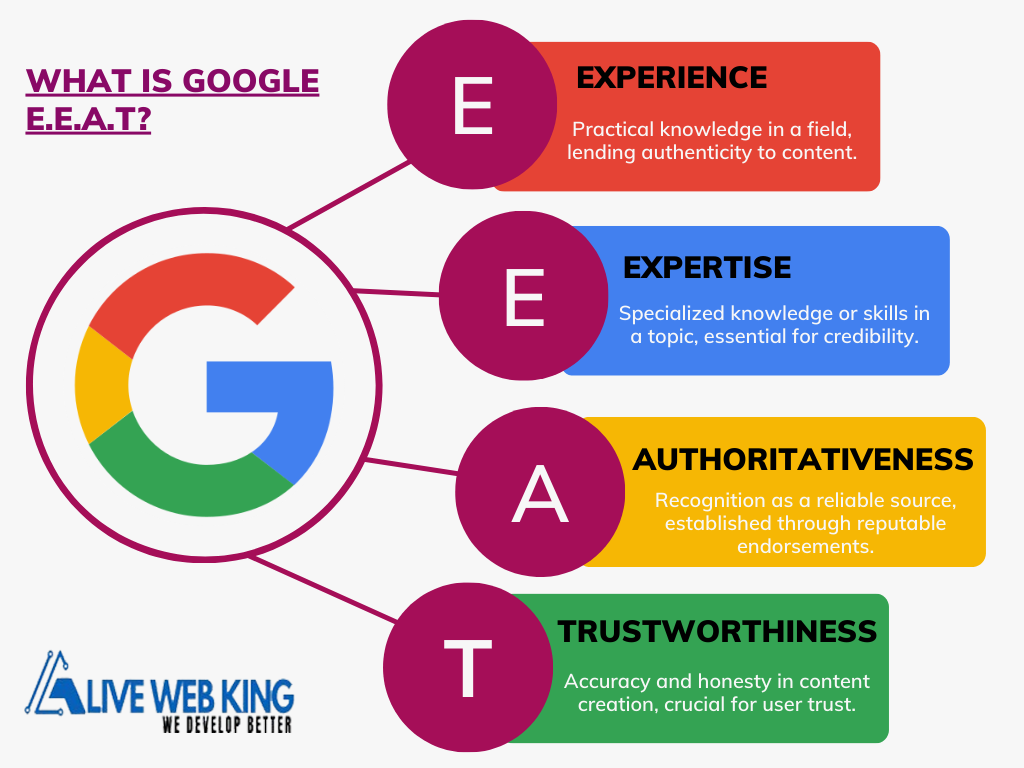What is Google E-E-A-T? Guidelines and SEO Benefits Explained
If you have been trying to improve your websites Seo, then you might have heard about something called EEAT. It sounds completely technical, but you don’t have to worry as it’s actually very simple once you break it down. In this guide you can learn everything about EEAT.
What do you need to know about EEAT?
EEAT Actually stands for experience expertise authoritativeness and trustworthiness. These are the four main stages Google looks at when deciding whether your content is high quality and should rank well. It comes from Google’s search quality evaluator guidelines. It is a document that Google gives to people who help test and improve its search results. It’s not a part of Google’s algorithm directly but it gives you a clear picture of what Google wants.
A closer look at each part of EEAT
Experience
Google now wants to know does the person creating the content have real world experience. It is especially important for topics like product reviews personal stories or tutorials. For example, if you are writing A blog post about how to install a washing machine Google wants to see that you have actually done it it’s not just copied tips from any other websites. So, you can show experience by sharing personal stories or real-life photos or you can even use firsthand details that only somebody with experience will know.
Expertise
Expertise means that are you knowledgeable about the topic?
You don’t always need to have a degree or a certificate. But you should understand that subject deeply. For example, if you’re running a food blog you don’t need to be a professional chef but if your recipe is always working and people trust them that shows the experience. So, you need to write detailed content helpfully and make sure that your facts are correct. You should use your own voice and not copy others.
Authoritativeness
Authoritativeness means are you or your website recognized as go to source. This could mean other websites look to your content and people talk about your brand online. You have strong credentials or lots of good reviews. For example, a medical article written by a doctor has more authority than one written by a random person on a new blog. You can easily build authority by getting backlinks from trusted websites and be active on social media and forums in your niche.
Trustworthiness
Trust is the most important factor. Google wants to make sure that your website is safe, honest and reliable. An online shop needs to have a secure website, clear return policies and of course real customer service. You can easily build trust by the self-certificate and include contact information privacy policy and disclaimers. Don’t make false claims or mislead readers.
Why is EEAT so important for SEO?

Google wants to show the best most trustworthy content to users. If the website shows strong EEAT you are more likely to appear higher in the search results. It is especially important for topics like health finance news and legal advice. These are called your money or your life topics because they impact your target audiences life and money.
Websites with poor EEAT can get hit by Google updates. Your rankings might drop if Google thinks your content is not trustworthy or accurate. So, building this helps you stay safe from these algorithm changes.
Even beyond SEO EEAT what is good for your readers? When people feel your content is reliable and helpful they’ll stay longer come back again and also maybe even become customers. That means better conversion rates, more shares and strong brand loyalty.
So above all you need to know that Google’s EEAT is not just another SEO buzzword it’s actually the foundation of good content. If you, what should you look at that product substance want your website to rank to rank higher build trust and keep growing then EEAT is very important. It’s very important for you to show experience by writing from personal or professional experience and prove your expertise with detailed correct information. Improving your EEAT won’t give you instant results overnight but with time it will help you build a strong lasting presence.
